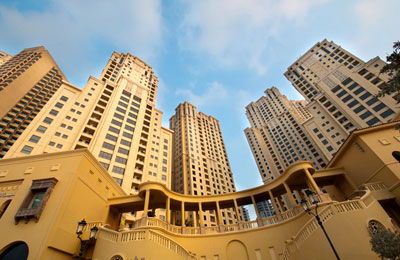
IMF warns Dubai on debt, surging property prices
Dubai, July 31, 2013
The International Monetary Fund has warned Dubai that the emirate might need to intervene in its property market to prevent another boom-and-bust cycle of the kind which brought it close to default four years ago.
Over-inflated Dubai real estate prices crashed by more than 50 per cent in 2009 and 2010, triggering a corporate debt crisis which unsettled financial markets around the world.
The economy and the property market are now recovering, but so strongly that the IMF worries another bubble could form - and because Dubai's debt has continued to rise, it might have difficulty coping with fresh instability.
Harald Finger, IMF mission chief to the United Arab Emirates, noted that by one commercial bank's estimate, listed Dubai property prices soared 35 per cent from a year ago in June.
"It is too early to speak of a bubble, but should price increases continue to take place at this pace, action will need to be taken to prevent a bubble," he said after annual economic consultations between the IMF and the United Arab Emirates.
Last year the UAE central bank tried to introduce caps on home mortgage lending as a way to head off another bubble, but suspended them after lobbying by commercial banks, which complained their business would suffer.
The central bank is now negotiating revised caps with the banks, but Finger said that because much home buying in the UAE was done with cash rather than mortgages, the mortgage rules would need to be complemented by other measures.
If property prices continue to surge, one suitable step might be introducing fees on real estate market activity, he told a media conference call.
However, Dubai's business success has been built on a low-tax environment, and it is not clear whether the emirate would be willing to consider such a step.
Finger said he had discussed the idea of fees with Dubai officials, who had replied that they might be considered but would need careful coordination with the rest of the UAE to ensure that Dubai's competitiveness was not damaged.
NEW PROJECTS
Dubai property developers, many of them linked to the government, have announced a string of massive real estate projects over the past nine months, including high-end housing, shopping malls and amusement parks - reminiscent of previous building crazes that included the construction of palm-shaped man-made islands and other high-profile projects.
The Al Bayan newspaper, a UAE publication, calculated that if they all went ahead, the projects would require total financing of over 666 billion dirhams ($180 billion).
Finger said that since Dubai's government-linked enterprises (GREs) were still saddled with debt from the last crisis, they would need to tread carefully to avoid being vulnerable if another bout of volatility in global financial markets hit the emirate's property sector.
"These projects increase business confidence, but they also call for prudent economic policies in order to prevent a possible build-up of a renewed boom-and-bust cycle in the UAE."
In a report, the IMF said the total debt of the Dubai government and its GREs had risen $13 billion to $142 billion between March 2012 and April 2013, reaching 102 percent of the gross domestic product of Dubai and the UAE's small northern emirates. Finger called that level "a source of concern".
The government's debt rose $4.5 billion as Emirates NBD , Dubai's top bank, lent it more money. The concentration of ENBD's loans to the government is high, raising corporate governance and risk management concerns, the IMF said.
ENBD has said it is managing its loan book prudently and this month cut its estimate of non-performing loans this year because of a strengthening local economy.
The IMF estimates that about $64 billion of debt held by Dubai and the GREs will come due between 2014 and 2016, some of it the result of debt restructuring deals done in the wake of the last crisis.
A plunge in Dubai bond yields last year shows that financial markets believe the emirate will have little trouble repaying that debt. But the IMF said: "Although Dubai's operating environment improved markedly, these large rollovers, particularly for the GREs, could still prove challenging.” – Reuters







